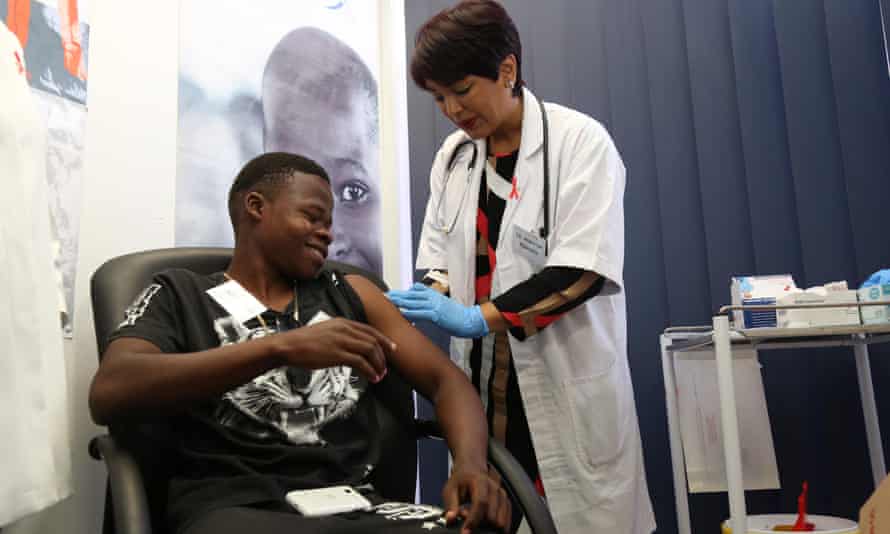The first trial in Africa to test two new vaccines to protect against HIV got under way in Uganda this week, raising hopes of an end to the epidemic that affects millions of people across the continent.

The African-led PrEPVacc study will test two experimental combination vaccines to see if they can provide any protection against HIV in people most at risk of infection.
At the same time, a new form of daily oral pre-exposure prophylaxis (PrEP) will be offered to participants, which scientists say will give the vaccines the best possible chance of working.
The two vaccines have been tested for safety in previous clinical trials in Africa, Europe and the US.
More than 1,600 people between the ages of 18 and 40 are expected to participate in clinical trials over the next three years in Uganda, Tanzania, Mozambique and South Africa.
The study is being funded by the European and Developing Countries Clinical Trials Partnership, supported by the EU.
“PrEPVacc provides two great opportunities: first, for Africans to be able to participate and lead in the first HIV prevention trial to test two ways to prevent HIV, a scourge that has ravaged the continent,” said Prof Pontiano Kaleebu, the PrEPVacc chief investigator.
“Second, an opportunity to grow the capacity of African sites to do future trials themselves and to foster our own future leaders,” he said.
Prof Jonathan Weber, dean of the faculty of medicine at Imperial College London, which is sponsoring the PrEPVacc trial, said: “The first PrEPVacc trial participants in Masaka [Uganda] are helping their communities and the world by answering important questions about how we can best prevent HIV in future.
“I have been working at Imperial College London on ways to prevent HIV since the virus was first discovered and I am immensely proud that we now have this African-led, European-supported trial beginning in Uganda.”
Weber said the importance of the study was that it “will either rule out or encourage further development of two different combination vaccine regimens for preventing HIV”.
More than 35 scientists, clinicians, social scientists, community liaison officers and support staff at the Uganda Virus Research Institute and London School of Hygiene and Tropical Medicine are involved in the trial in Uganda.
An estimated 20.7 million people are living with HIV in east and southern Africa. In 2019, the region saw 730,000 new infections and 300,000 Aids-related deaths, according to UNAids data. At least 15 million people are receiving treatment.

“In case the vaccine prevents HIV infection, we shall be excited. But even if it doesn’t protect, we still learn. There is no trial which is a failure. The science we learn from the study allows us to improve and to have better vaccines,” said Kaleebu.
Prof Sheena McCormack, PrEPVacc project lead, based at the Medical Research Council clinical trials unit at University College London, said the trial would also address questions raised about PrEP. “Its results will be valuable for informing future implementation and uptake strategies by local stakeholders and champions across east and southern Africa where PrEP uptake is currently low.”
Milly Katana, HIV prevention campaigner and member of the project’s steering committee, said the trial was timely. “The implementation of the PrEPVacc trial is coming at a time when the world is more appreciative of vaccines in managing global pandemics like HIV and Covid-19 … The world, especially women, need more interventions that can protect individuals from contracting HIV.”
Sylvia Nakasi, acting executive director of the Uganda Network of Aids Service Organisations, said the trial is “a great step in HIV prevention research”.
“We must accelerate HIV prevention in addition to care and treatment if we are to end HIV by 2030. PrEP is an important biomedical tool and having these two experimental vaccines will address issues of adherence, but will also promote choice.”
However, Asia Russell, executive director of the Health Global Access Project, questioned why Uganda was undertaking a vaccine trial when many people still can’t access antiretroviral drugs or Covid-19 vaccines.
“Ugandans are constantly asked to volunteer their bodies for science,” she said.
According to the Uganda Aids Commission, the HIV epidemic remains a major public health threat in Uganda. About 1.5 million people are living with the virus, up from 1.2 million in 2010. Annually the country registers 53,000 new infections and 21,000 Aids-related deaths.


No comments:
Post a Comment
Note: only a member of this blog may post a comment.